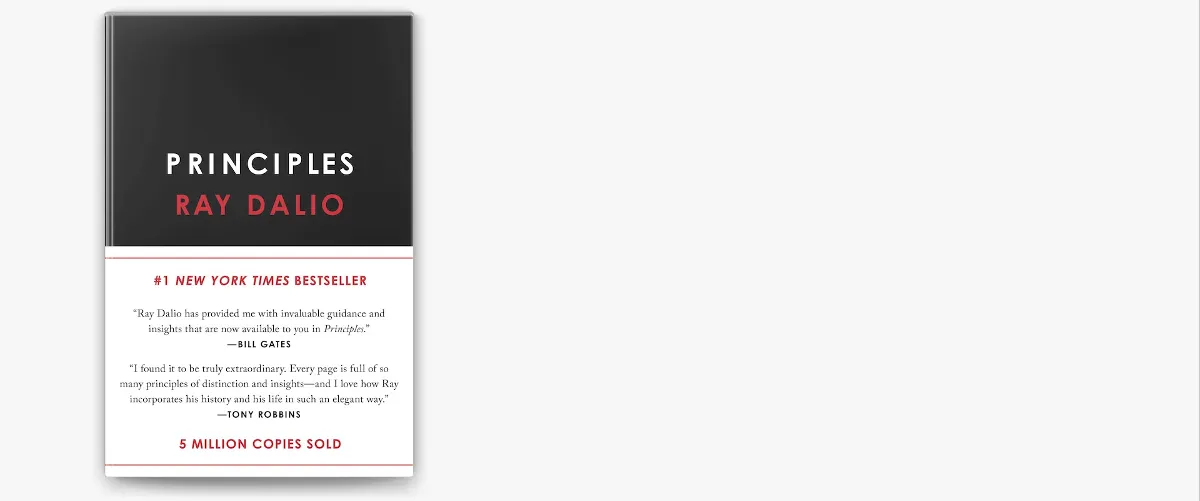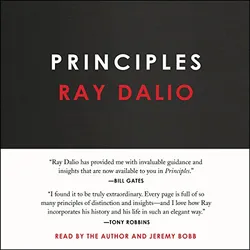
Book: Principles
- Eric Kraus
- productivity
- Apr 28, 2018
Time is like a river that carries us forward into encounters with reality that requires us to make decisions. We can’t stop our movement down this river and we can’t avoid these encounters, we can only approach them in the best possible way
No doubt, Principles by Ray Dalio will have been one of my favorite read books of 2018 (and probably, my lifetime ). It is long, but well worth the time investment it.
Book Outline
The book is really three different parts (or separate books) bound together:
Part 1: Ray’s personal story - his journey in creating Bridgewater Associates, an extremely success investment management firm that is responsible for over $160B in funds.
Part 2: Life Principles - is the meat of the reason you might buy the book. It’s organized as a list of Ray’s personal principles that he chooses to live his life by. Not just a list, it contains a wonderful thought-breakdown of how he came up with them, why they are important and how he approaches each one.
Part 3: Work Principles - basically an application of Life Principles, applied to work. There is less behind-the-scenes in this section of the book and more straight-to-the-point, putting it in action.
How to Read it
Ray’s advice in the beginning of the book is sound. Don’t treat it as him being humble. He has bound three different books together in one, and he doesn’t want you to waste your time. Here’s my own flavor of his advice:
If you don’t really care for his personal story, skip it. No one’s feelings will be hurt. At the time of writing this, I’m not running my own business or in the investment space. While interesting, there was not a lot of immediate value I drew from this section. Think of it like a brief memoir that helps you understand how the book came about
Life Principles is like a normal book; read it start/finish.
Part 2: Life Principles is the reason you buy this book. I believe the content in this section can apply to everyone.
Use the third part of the book, Work Principles, as a reference manual…don’t necessarily read it start/finish unless you just want to.
Look back at it when you encounter situations at work and need suggestions for how to approach difficult decisions.
In order to count it for my 100 books goal , I ignored the advice above and read it cover-to-cover. No regrets. But, I wanted to share an emphasis on Ray’s advice as it holds true.
General Impression
For the most part, the rest of this summary/review focuses on the second section of the book: Life Principles.
Pros : I could write pages and pages (I did in my journal) on the advice Ray leaves with you. In fact, I even started my own Life Principles project to begin documenting my own.
As mentioned above, this section is outlined very well but also goes deep into explaining why the principles are important in many aspects of life. It’s easy to read, immediately applicable and I found myself highlighting entire paragraphs and pages and ultimately had a stop altogether - it was all good.
Cons : Like with many authors I’ve found in the business (or possible misnomer: “self-help”) section, many parts of the messaging can often get repetitive. That part is somewhat inevitable in Life Principles, where the principles all support one another and are intertwined.
You might think that is what contributes to the size of this book; however, you would be wrong. It it packed with MANY (new) ideas - not just the same old tips repurposed in a new book.
My Favorite Concepts
To avoid this being an insanely long post, I will share some of my favorite takeaways in bullet form without any reflection (they are good enough on their own).
- people will better admire your work if you can prevent them from becoming threatened or jealous
- obsess with finding right, not being right
- most people call something “bad” only because it is bad for them
- don’t be embarrassed by your problems; be embarrassed by not working to solve them
- don’t be afraid to fire yourself if you are not the right fit; lead yourself first, before you can lead others
Einstein was a genius, but would you want him on your basketball team?
- humility is probably the most important skill
- you can’t learn what you [think you] already know
- be clear about whether you are arguing or seeking more information to understand better
- before you make a statement, ask yourself if you know everything there is to know to make a statement. if not - phrase it in a question
- it is never harmful to hear an opposing viewpoint; it shouldn’t threaten you to learn more
- people often make decisions first and cherry-pick data to support their decision (confirmation bias)
- focus, focus, focus on doing the must-do things very well (and first)
Summary
The list above is probably 5% of what I noted and took away from the book. I have already referred back to Part 3: Work Principles once or twice in working with my teams on some difficult projects.
Can’t say enough: highly recommend this one.




